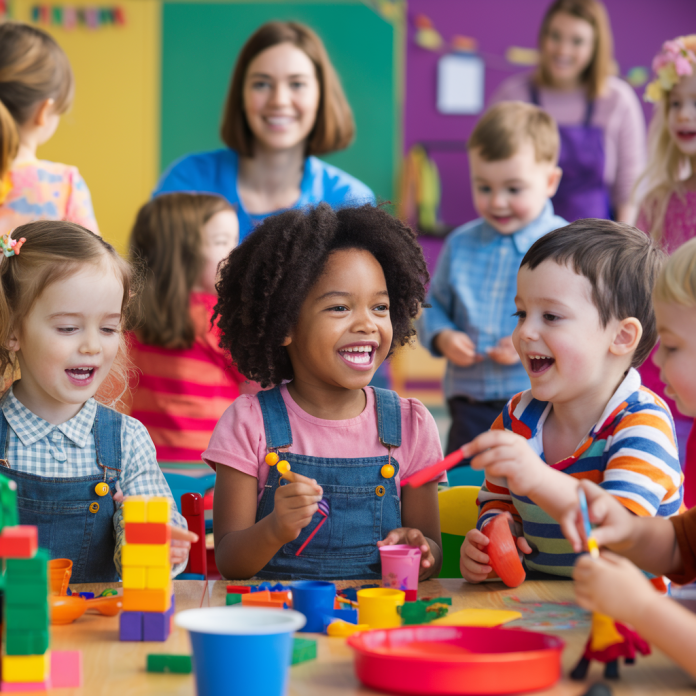Introduction
Play is often regarded as a simple, joyous activity for children, but its significance extends far beyond mere entertainment. The benefits of play for kids are extensive, touching on numerous aspects of their development and well-being. From fostering cognitive growth to enhancing social skills, play is a crucial element in childhood development. This article explores the multifaceted advantages of kids’ play and underscores its importance in nurturing well-rounded individuals.
Cognitive Development
One of the primary benefits of play for kids is its impact on cognitive development. Through play, children engage in activities that promote critical thinking and problem-solving skills. For instance, when children play with building blocks, they are not just stacking pieces together; they are experimenting with balance, symmetry, and spatial awareness. These activities help develop their cognitive abilities and prepare them for more complex tasks in the future.
Moreover, imaginative play allows children to explore different scenarios and outcomes, fostering creativity and innovation. Role-playing games, such as pretending to be a doctor or a teacher, enable kids to think abstractly and understand various perspectives. This kind of play enhances their ability to process information and apply knowledge in diverse situations.
Social Skills
Kids’ play is instrumental in developing social skills. When children play together, they learn to communicate, collaborate, and negotiate. These interactions are vital for developing empathy and understanding others’ viewpoints. Group games, whether structured or unstructured, teach children the importance of taking turns, sharing, and working as part of a team.
Play also helps children develop conflict-resolution skills. Disagreements are inevitable during playtime, and navigating these conflicts teaches children how to handle disputes constructively. They learn to articulate their feelings, listen to others, and find mutually agreeable solutions. These skills are essential for building healthy relationships throughout their lives.
Emotional Development
Play provides an outlet for children to express their emotions and manage stress. Through play, children can explore their feelings in a safe and controlled environment. For instance, a child who is frustrated can channel that energy into a vigorous game of tag or a creative art project. This helps them process and release negative emotions constructively.
Additionally, play fosters resilience. When children encounter challenges during play, such as a difficult puzzle or a competitive game, they learn to persevere and cope with failure. Overcoming these challenges boosts their self-esteem and confidence, equipping them with the emotional tools to face future adversities.
Physical Development
The physical benefits of play for kids are undeniable. Active play, such as running, jumping, and climbing, is crucial for developing motor skills and overall physical health. These activities help children improve their coordination, balance, and strength. Regular physical play also promotes cardiovascular health and helps prevent childhood obesity.
Furthermore, outdoor play exposes children to fresh air and sunlight, which are essential for their physical well-being. Sunlight is a natural source of Vitamin D, which is important for bone health and immune function. Playing outdoors also encourages children to appreciate nature and develop a lifelong habit of staying active.
Language Development
Language skills are another area where play proves beneficial. Through interactive play, children expand their vocabulary and improve their communication abilities. Storytelling, whether through imaginative play or reading, introduces children to new words and concepts. Engaging in conversations during playtime helps children practice sentence structure and conversational dynamics.
For younger children, songs and rhymes during play can enhance phonemic awareness, an essential skill for reading. Repetition of sounds and rhythms helps children recognize patterns in language, aiding their literacy development.
Enhancing Creativity and Imagination
Play is a natural catalyst for creativity and imagination. When children are given the freedom to play, they can invent new worlds and scenarios, turning simple objects into extraordinary tools. A cardboard box can become a spaceship, a castle, or a hiding place. This imaginative play is crucial for cognitive flexibility and innovation.
Creative play also encourages children to experiment and take risks in a safe environment. They can explore new ideas and test boundaries without fear of failure. This kind of experimentation is foundational for creative thinking and problem-solving skills, which are highly valuable in adulthood.
Building Independence
Kids’ play is essential for fostering independence. When children engage in self-directed play, they learn to make decisions, solve problems, and entertain themselves. This autonomy is critical for developing a sense of self-efficacy and confidence. Children who are accustomed to playing independently are more likely to be self-reliant and resourceful as they grow older.
Unstructured playtime, where children decide what and how to play, is particularly beneficial for building independence. It allows them to follow their interests and curiosities, promoting intrinsic motivation and self-discipline.
Academic Performance
The benefits of play for kids extend to their academic performance. Numerous studies have shown that children who engage in regular play perform better academically. Play-based learning, which integrates play into the educational process, enhances children’s engagement and understanding of academic concepts.
For example, educational games that involve counting, sorting, and pattern recognition can reinforce mathematical skills. Similarly, science experiments conducted as part of play can foster a deeper understanding of scientific principles. Play helps children apply theoretical knowledge in practical ways, making learning more meaningful and enjoyable.
Play and Mental Health
The mental health benefits of play cannot be overstated. Play is a natural stress reliever, allowing children to unwind and relax. It provides a break from the pressures of structured activities and academic demands. Engaging in play can reduce anxiety, improve mood, and enhance overall mental well-being.
For children facing emotional or psychological challenges, therapeutic play can be particularly beneficial. Play therapy, guided by trained professionals, uses play to help children express their feelings, process trauma, and develop coping strategies. This form of therapy can be a powerful tool for promoting mental health and emotional healing.
Promoting Lifelong Skills
The skills and benefits gained from play during childhood lay the foundation for lifelong success. Critical thinking, creativity, social interaction, emotional regulation, physical health, and independence are all nurtured through play. These attributes are essential for personal and professional success in adulthood.
Moreover, a playful attitude and the ability to find joy in activities can contribute to a positive outlook on life. Adults who retain a sense of playfulness are often more adaptable, resilient, and capable of finding balance between work and leisure.
Encouraging Safe and Inclusive Play
To maximize the benefits of play for kids, it is important to create safe and inclusive play environments. Parents, educators, and communities can take steps to ensure that all children have access to play opportunities. This includes providing safe play spaces, encouraging inclusive play that respects diversity, and supporting initiatives that promote play in schools and communities.
Structured and unstructured play should be balanced to provide children with a variety of experiences. While structured play, such as sports and organized activities, offers valuable skills and socialization, unstructured play allows for creativity and self-directed learning.
Conclusion
The benefits of play for kids are extensive and profound, impacting nearly every aspect of their development and well-being. From cognitive and social skills to physical health and emotional resilience, play is an essential component of a healthy childhood. By understanding and supporting the multifaceted advantages of kids play, parents, educators, and communities can help nurture well-rounded, happy, and successful individuals.




